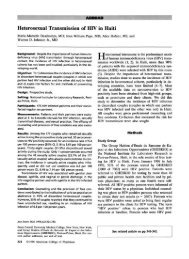Behavioural Surveillance Surveys - The Wisdom of Whores
Behavioural Surveillance Surveys - The Wisdom of Whores
Behavioural Surveillance Surveys - The Wisdom of Whores
You also want an ePaper? Increase the reach of your titles
YUMPU automatically turns print PDFs into web optimized ePapers that Google loves.
Where the supervisor is present editing<br />
will be done on the spot by the supervisor<br />
in order to avoid re-contacting respondents<br />
which is quite likely to be difficult and<br />
impractical given the time frame for fieldwork<br />
completion. Note that field editing is especially<br />
important at the beginning <strong>of</strong> fieldwork<br />
when interviewers are less familiar with the<br />
questionnaire. Each edited questionnaire<br />
should be reviewed with the interviewer who<br />
completed it and signed by the supervisor.<br />
All questionnaires should be reviewed from<br />
beginning to end for the following:<br />
• Verify that an interview result code has<br />
been recorded in the interviewer visit box<br />
on the cover page <strong>of</strong> the questionnaire.<br />
• Verify that the interviewer has signed the<br />
witnessed verbal consent.<br />
• Verify that all skip and filter instructions<br />
have been respected.<br />
• Verify that the responses are legible.<br />
• Verify that only one response code is<br />
circled for each question unless instructions<br />
allow for more than one response. For<br />
questions which allow for more than one<br />
response, verify that codes “2” (No) have<br />
been circled for all responses not coded “1”.<br />
• Verify that any corrections made by<br />
the interviewer are done legibly and<br />
according to the instructions in Part B <strong>of</strong><br />
the Interviewers’ Guidelines.<br />
In reviewing the questionnaires, supervisors<br />
are to ensure that all consistency checks as<br />
outlined in Part D <strong>of</strong> the Interviewers’ Guidelines<br />
were utilized and adhered to.<br />
Part A: General interviewing<br />
procedures<br />
Introduction and Objectives<br />
As an interviewer, you are part <strong>of</strong> a very<br />
important research endeavor to collect<br />
information on people’s knowledge, attitudes,<br />
beliefs, and practices regarding HIV/AIDS<br />
and other STDs. <strong>The</strong> main objectives <strong>of</strong> this<br />
research are to learn:<br />
• How much do people in this area understand<br />
about transmission and prevention<br />
<strong>of</strong> HIV, the virus that causes AIDS, and<br />
other STDs ?<br />
• What influences people’s information about<br />
AIDS and HIV ?<br />
• What are common sexual practices related<br />
to the risk <strong>of</strong> AIDS or HIV transmission in<br />
this population?<br />
• What behavioral changes, if any, have<br />
people adopted in order to avoid<br />
contracting HIV?<br />
Interviewer duties :<br />
Your main duties as an interviewer include:<br />
• To be prepared, and have all the necessary<br />
supplies: questionnaires, guidelines, a pen<br />
or pencil, and samples <strong>of</strong> male and female<br />
condoms [if necessary], required administrative<br />
forms (such as logs <strong>of</strong> assigned or<br />
completed interviews) which vary from one<br />
setting to another.<br />
• To read each question aloud exactly as it<br />
is written in the questionnaire.<br />
• To listen carefully and without judgment to<br />
your respondent’s answers and comments.<br />
• To accurately record the respondent’s<br />
answers on the questionnaire according to<br />
instructions in this manual.<br />
286<br />
A PPEN DI X 2 B EHAV I OR A L SURV EI L L A NC E S U R V EY S










